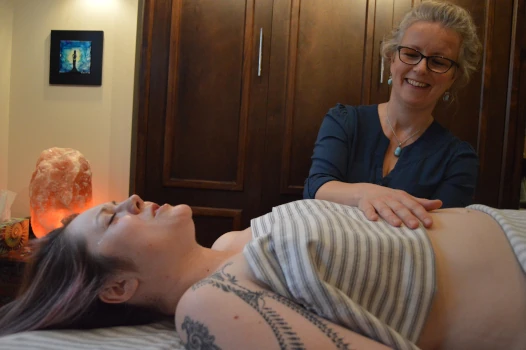Four Ailments That Can Benefit from Massage Therapy
Tuesday, August 22, 2023, 03:52 PM
Massage therapy is a widely accessible treatment that can significantly benefit your well-being. From treating acute and chronic conditions to improving your body's healing process and releasing stress, massage therapy has potential beyond relaxation.
Despite its popularity in providing therapeutic benefits, some misconceptions still exist. One is that massage therapy is a luxurious activity only reserved for special occasions or vacations.
While it can provide a luxurious experience — especially in a spa setting, wrapped in a cozy robe — massage therapists work in various environments, including physiotherapy and chiropractic clinics, and even at your home providing mobile massage.
Massage therapy can greatly benefit your wellness journey and significantly improve several conditions. Many Canadian insurance companies recognize massage, and your personal or employee benefits may cover your treatment, making it more accessible.
If you're wondering what types of ailments massage therapy can help address, continue reading to find out!
Alleviating Plantar Fasciitis

Tired of living with plantar fasciitis pain? Turn to massage therapy for relief!
Plantar fasciitis is a condition involving the swelling of the plantar fascia, a tissue band that joins the heel bone to the toes and runs across the length of the foot.
Plantar fasciitis can cause pain and discomfort, resulting in chronic pain if left untreated. It is prevalent among runners or those on their feet for long hours.
A recent study out of MacEwan University revealed that massage may decrease pain and impairments in those suffering from plantar fasciitis. Massage therapy promotes healing and reduces inflammation by stretching the tissue and increasing blood flow to the area.
Those with plantar fasciitis can benefit from a whole-body massage, not only massage localized to their feet and lower body. Many people don't realize that addressing the whole body can help; one seemingly unrelated issue can cause problems across the entire body.
Easing Carpal Tunnel Syndrome

Massage therapy is an effective way to help relieve and prevent symptoms of carpal tunnel syndrome.
Carpal tunnel syndrome (CTS) is a condition that affects the hands, arms, and wrists. It is caused by pressure on the median nerve, which passes through the carpal tunnel in the wrist to the hand.
Massage therapy can help treat carpal tunnel syndrome by reducing inflammation, pain, and numbness in the affected area. This happens by lengthening the muscles and fascia (a connective net-like tissue that surrounds every muscle, tendon, and organ in our body) in the neck, shoulders, arms, wrists, and hand.
Other methods may be used by your therapist to effectively address symptoms associated with carpal tunnel syndrome, such as deep tissue massage to stimulate trigger points linked to inflammation or trauma.
Myofascial cupping can also be applied to the area to help reduce tension in the soft tissues. Watch our myofascial cupping demonstration to see what this therapy involves.
Improving Digestive Issues
According to the Canadian Digestive Health Foundation, Canada has one of the highest rates of irritable bowel syndrome (IBS) in the world, at about 18% compared to 11% globally. More than 20 million Canadians suffer from digestive disorders every year. A 2023 study examined abdominal massage for constipation and found it effective in improving symptoms.
Visceral manipulation, also known as organ or abdominal massage, is a gentle hands-on technique, that can help relieve digestive disorders such as IBS, constipation, nausea, and acid reflux. It supports normal mobility, tone, and motion of the viscera (the internal organs) and their connective tissues.
Practitioners use up-and-down, back-to-front, and side-to-side motions to massage the organs and release tension or restrictions.

While visceral manipulation is considered safe for most people, it's important to consult a health care provider before seeking this treatment and disclose your health history to your practitioner before receiving treatment.
Therapists are trained to work cautiously and will not perform the treatment if they feel it is unsafe for the client. Some contraindications include acute infection, inflammation, recent abdominal trauma, and pregnancy.
Managing Vertigo
Vertigo is a condition caused by a problem in the inner ear. HealthLink BC explains that "benign paroxysmal positional vertigo (BPPV) is a balance problem that makes you feel like you're spinning or tilting (vertigo) if you move your head a certain way."
Ontario Blue Cross estimates that approximately 1.5 million Canadians suffer from vertigo.
Massage therapy can help vertigo by:
- stimulating trigger points in the anterior neck muscles to help resolve sensations of dizziness
- promoting circulation and nerve supply to increase sensation (lowering the risk of falling due to poor balance)
- relieving stress and helping with migraine headaches
Ruth Werner, accomplished massage therapy writer and educator, explains that BPPV is linked to the head's position in relation to the horizon, making laying down on a massage table difficult. Therefore, chair massage may be a good alternative option.
Talk to your health care provider before seeking massage therapy for vertigo.

Find a Massage Therapist
Massage therapy offers diverse benefits which can help enhance your overall well-being. Consider incorporating massage therapy into your wellness journey and consult a health care provider to ensure the most appropriate treatment approach.
When you're ready to experience the benefits of massage therapy, find a practitioner using our member directory.

